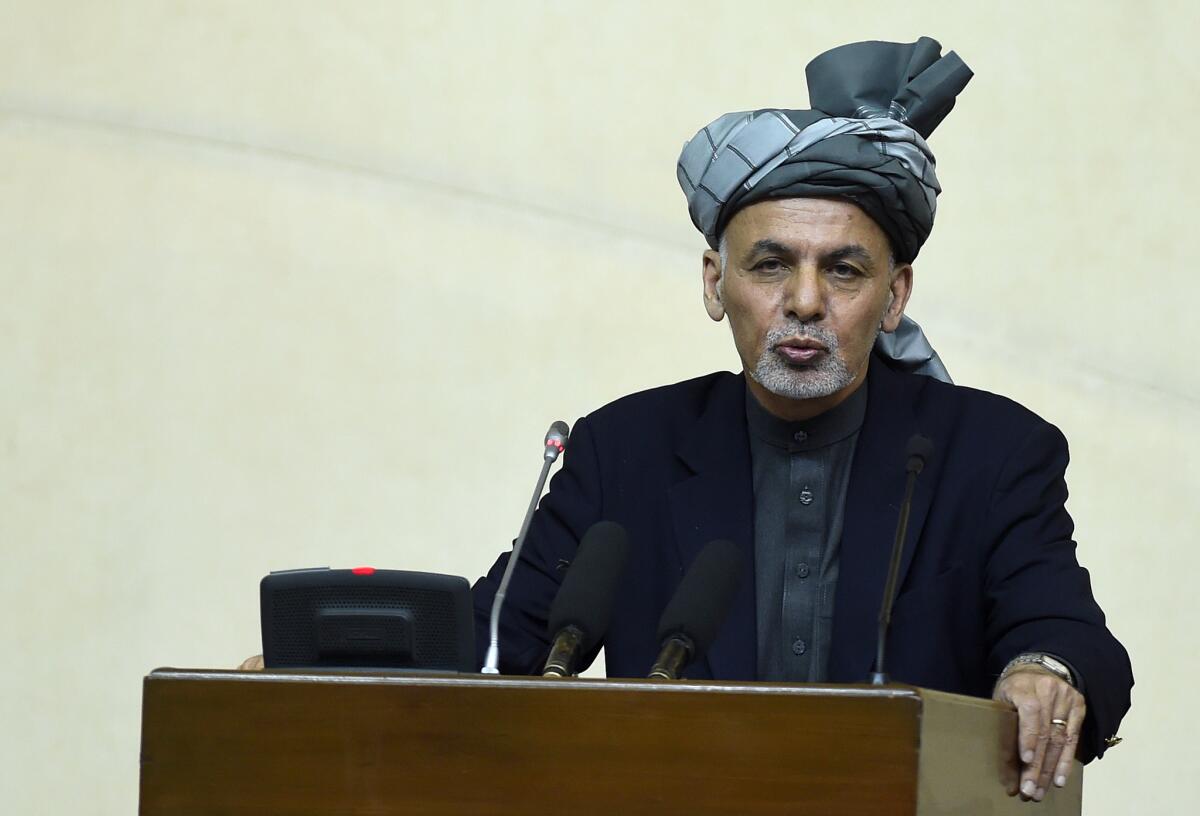No more peace talks with Taliban, Afghanistan’s president says

Afghan President Ashraf Ghani speaks to the nation’s parliament in Kabul on Monday.
reporting from Kabul, Afghanistan — Afghan President Ashraf Ghani pulled the plug Monday on his failing effort to start peace talks with the Taliban. The talks have been a centerpiece of his foreign policy since he took office more than 18 months ago.
In a pointed speech before parliament, he issued his most direct challenge yet to Pakistan to battle the insurgents who he said originate from its territory. He called on Pakistan to act as a “responsible government” and launch military operations against the Taliban and its allies, who are widely believed to be based in Pakistan’s tribal belt. If Pakistan didn’t do so, he said, Afghanistan was willing to bring the issue to the United Nations Security Council.
“We do not expect Pakistan to deliver the Taliban for negotiations,” Ghani said, adding that Pakistan should instead keep promises it has made to carry out military operations against insurgents on its soil.
Ghani also referred to the Taliban as “terrorists” for the first time, a term he had previously been criticized for avoiding.
Now, rather than holding peace talks, Ghani said, Afghan security forces would take on the Taliban and other armed opposition groups directly.
The Taliban seemed to take note, rebuking the president on social media. “The slaves ruling Kabul... are not the leaders of the nation but lackeys imposed on the nation by Kerry,” an account affiliated with the group tweeted after the speech, referring to U.S. Secretary of State John F. Kerry.
Ghani’s remarks came nearly a week after a truck bombing killed 64 people and wounded more than 347 others in Kabul, one of the deadliest attacks in the Afghan capital in years. An initial investigation by Afghan intelligence attributed the attack to the Haqqani network, a Taliban-allied group based in Pakistan.
Ghani and Abdullah Abdullah, chief executive of Afghanistan’s unity government, had previously spoken out against Pakistan, particularly following a truck bombing in August that wounded nearly 400 people.
But in the ensuing months, both leaders tempered their stance against Islamabad after Pakistan joined Afghanistan, China and the United States in a four-nation effort to start peace talks with the Taliban.
Hoping to persuade Pakistan to bring Taliban leaders to the negotiating table to help end a conflict now in its 15th year, Ghani opened the door for Afghan military cadets to train in Pakistan, and he announced an intelligence-sharing agreement between the two countries. The moves sparked fervent criticism from opposition politicians and many Afghans who blame Pakistan for turning a blind eye to or directly supporting militant groups in Afghanistan.
That effort faltered when the main Taliban leadership showed little inclination to negotiate and continued offensives that have challenged the government’s control over parts of northern and southern Afghanistan.
Ghani said Afghan security forces were engaged in 15 military operations, across seven of the nation’s 34 provinces, meant to suppress the Taliban, the Haqqani network and other allied groups. He also told lawmakers that he would nominate a new defense minister and intelligence chief within days.
The acting defense minister, Massoom Stanekzai, has been serving in that role for more than a year. The former intelligence chief, Rahmatullah Nabil, resigned in December after he reportedly opposed Ghani’s approach to Pakistan.
Ghani said he would no longer offer “amnesty” to insurgents -- an apparent reference to the policy of former President Hamid Karzai, who some experts said freed thousands of captured militants who claimed to have renounced violence. One attacker responsible for the Kabul truck bombing last week had reportedly been freed by Karzai’s administration.
Latifi is a special correspondent.
Join the conversation on Facebook >>
ALSO
How peace talks have an economic effect on ordinary Syrians
Obama plans to send 250 more U.S. military personnel into Syria
One year after devastating Nepal earthquake, reconstruction has barely begun
More to Read
Sign up for Essential California
The most important California stories and recommendations in your inbox every morning.
You may occasionally receive promotional content from the Los Angeles Times.










